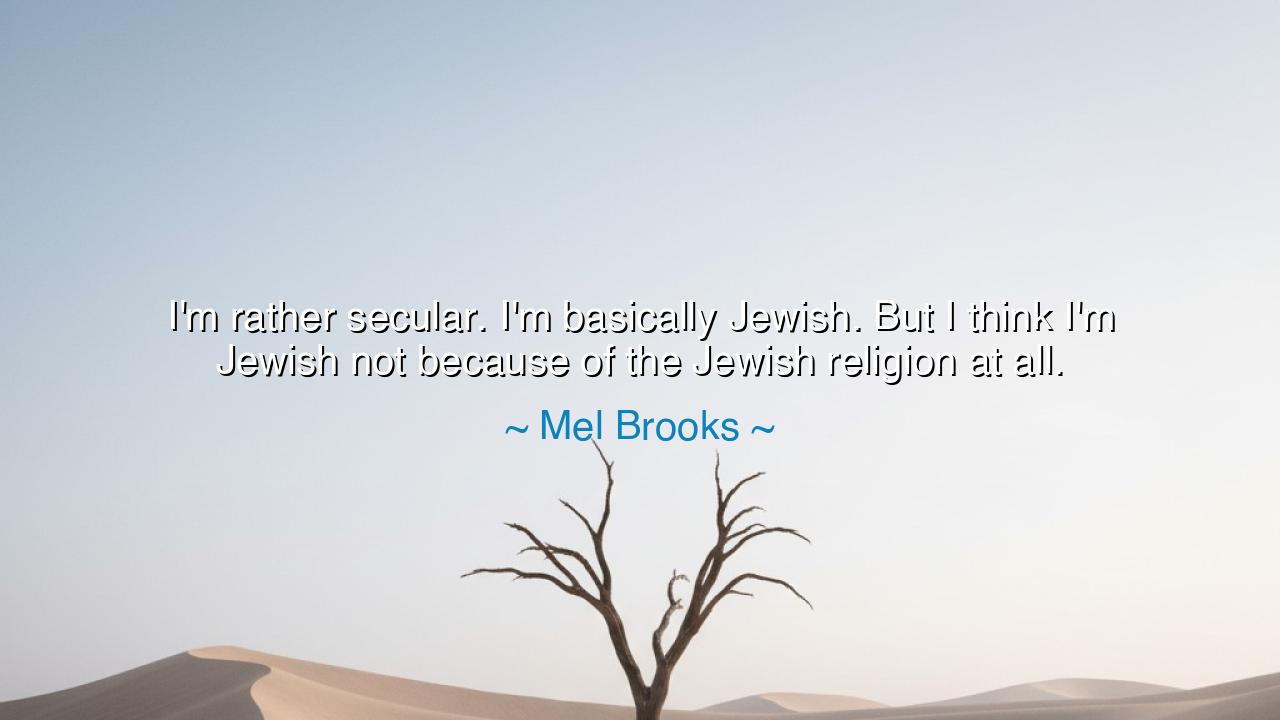
I'm rather secular. I'm basically Jewish. But I think I'm Jewish
I'm rather secular. I'm basically Jewish. But I think I'm Jewish not because of the Jewish religion at all.






“I’m rather secular. I’m basically Jewish. But I think I’m Jewish not because of the Jewish religion at all.” – Mel Brooks
In this humble and profound reflection, Mel Brooks, the great jester-philosopher of the modern age, reveals something deeper than mere humor: the enduring power of identity beyond creed. His words, though wrapped in the simplicity of conversation, shine with the wisdom of the ancients. When Brooks says, “I’m Jewish not because of the Jewish religion at all,” he is speaking of the spirit that transcends ritual—the essence of belonging, memory, and survival that has shaped peoples and souls throughout the ages. It is the recognition that faith, though born in temples and scriptures, often continues its song in the blood, the laughter, and the pain of generations.
The origin of such a statement lies in the history of a people who carried their identity through exile, suffering, and renewal. The Jewish story, written in both light and shadow, is not only a record of belief, but of endurance, creativity, and moral fire. Over centuries, as nations rose and fell, this people remained, sometimes stripped of land, sometimes silenced in prayer, yet never losing the essence of who they were. It was not only the religion that preserved them, but the deeper pulse of shared culture, language, and vision—the invisible thread of Jewishness that no oppression could sever.
Brooks, the son of poor immigrants, carried that thread into a world far from the ghettos and synagogues of his ancestors. He became a maker of laughter, yet his comedy was born from the same soil as his people’s resilience. Behind every jest, there was remembrance; behind every absurdity, a cry of defiance against tragedy. In saying he is “secular,” Brooks does not reject faith—he simply locates his identity not in doctrine but in inheritance, in the living current of a people who found holiness not only in prayer but in perseverance.
The ancients might have said that such belonging is the soul of a tribe—a spiritual inheritance that survives even when the temples are gone. It is the same spirit that made Socrates Greek though he questioned the gods of Greece, or that made Confucius Chinese though he spoke more of virtue than of heaven. Mel Brooks’s Jewishness is not a matter of synagogue or scripture, but of the sacred laughter that turns suffering into wisdom. To be “basically Jewish” in his sense is to embody the humor, compassion, irony, and tenacity that arise from generations of both joy and struggle.
There is a story told of a rabbi and a comedian who once met in a café. The rabbi asked, “Do you still believe in God?” The comedian laughed and said, “I don’t know. But when I see how the world is, I can’t stop arguing with Him.” The rabbi smiled and said, “Then you are still a Jew.” This tale captures the heart of what Brooks meant: faith may falter, but identity persists—it lives in dialogue, in humor, in memory, in the refusal to surrender meaning even when the heavens are silent.
Thus, Brooks’s words remind us that religion is but one garment of the spirit; culture, character, and conscience are its flesh and bone. You may not kneel at the altar, yet still carry the sacred fire within. To be part of a people, or a tradition, or even a dream, is not always to follow its rituals—it is to live its values, to echo its music through your own life. The divine may not dwell only in temples of stone, but in the human heart that remembers where it came from.
And so, dear listener, take this lesson to heart: know who you are, and cherish the stories that made you. Whether your roots are in faith, in culture, or in the simple inheritance of love and struggle, honor them. You need not pray to belong—you belong by being, by living in truth with your heritage. Mel Brooks, through laughter, teaches us what sages once taught through parables: that identity, like light, can change its form but never its essence.
To live as he did—joyously, aware of one’s roots yet free of dogma—is to find balance between past and present, belief and doubt. It is to walk through life carrying your ancestors not as a burden, but as a song. And when you laugh, when you create, when you act with kindness and courage, you too will be part of that divine inheritance—not of religion alone, but of the enduring spirit that keeps humanity alive through every age.






AAdministratorAdministrator
Welcome, honored guests. Please leave a comment, we will respond soon